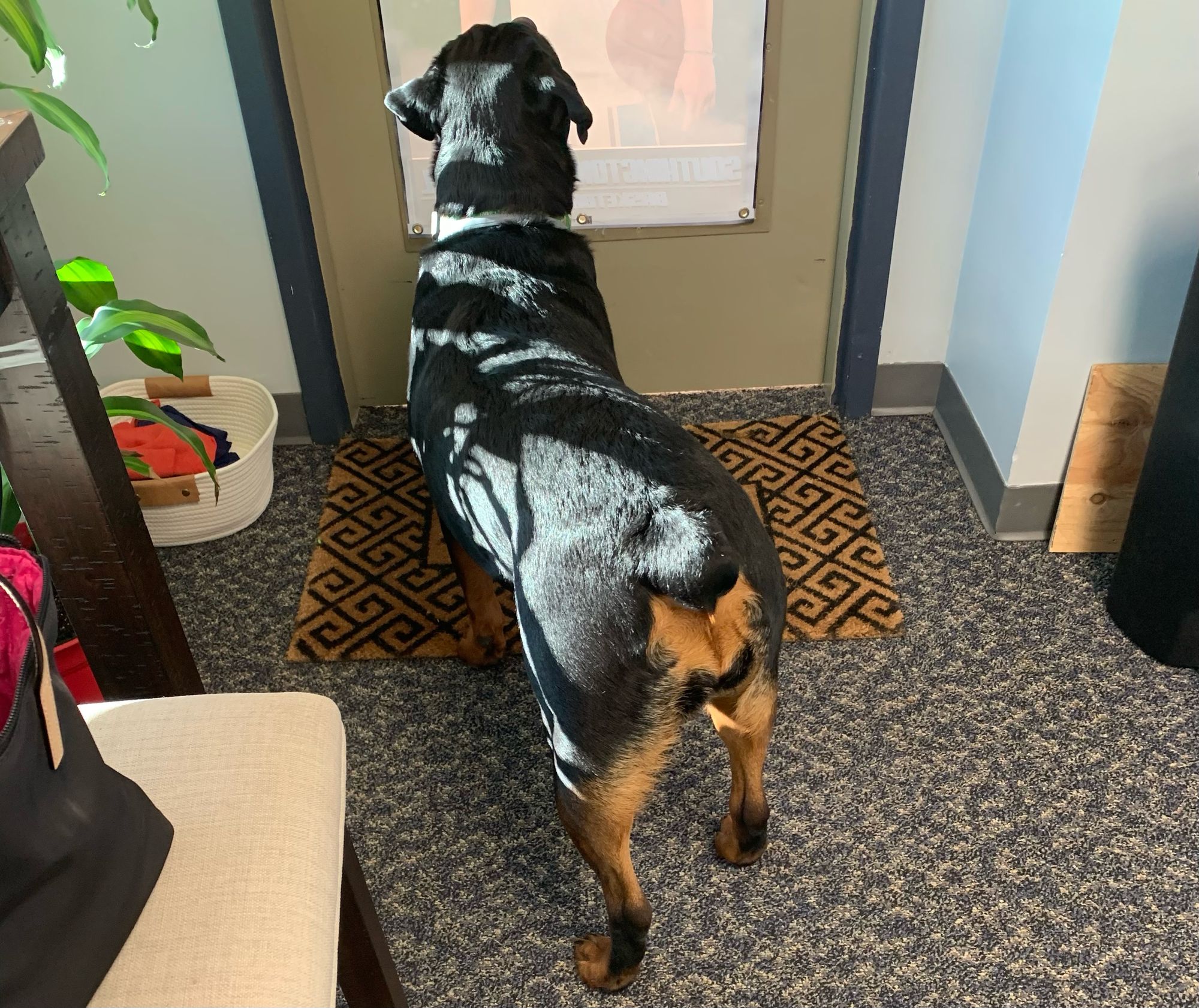Canine Calm: 7 Surprising Settings Where Therapy Dogs Shine
From airports to courthouses, here are 7 unexpected places we love to see therapy dogs spreading joy.

The appearance of therapy dogs has become a staple mental-health initiative in many educational spaces (ex. college campuses) as well as nursing homes and hospitals. However, the positive reach of these four-legged therapists and their enterprise of calm and comfort extends far beyond conventional spaces.
Through partnerships with growing therapy dog programs, other venues are now taking on new canine staff members to provide emotional support in frequently overlooked spaces that have occasion for some paws-itivity. At the end of the day, therapy dogs don't just brighten the mood of a room, they have stress-relieving physiological effects on those they interact with.
Notably, pet therapy, even when done in a brief session of 10 or 15 minutes, can lower blood pressure and "the cortisol levels in our bloodstream" while releasing oxytocin (the feel-good hormone) in the brain. All of which can help palliate social anxiety and depression as well as take the edge off the daily overwhelming hustle and bustle of life.
By offering moments of earnest and non-judgmental companionship, therapy dogs are, by and large, helping to lift spirits and infuse more comfort and relaxation in all sorts of public venues and facilities:
Airports
Traveling can be a supremely stressful experience, even for those who fly frequently. Between long lines, security checks, unexpected delays, and the general chaos of navigating a busy terminal, therapy dogs can provide some much-needed respite for travelers of all ages.
As of 2021, there are 37 airports running therapy dog programs. The canine crews popping up at various major airports (such as LAX) to de-stress passengers are usually sporting a vest that reads "Pet Me!" Many of these pups achieve certification via the Alliance of Therapy Dogs (ATD) and roam airports during a two-hour block with their owner or handler.
@chefaylaocho They got 99 dogs & 1 cat #therapydogsoftiktok #dogsoftiktok #englishbulldog #coloradoadventures #airportdelays #denverairport #airportlife
♬ original sound - Ayla Ochoa
What began as a welcome distraction for nervous travelers has made for many a canine celebrity, even leading to a new fad of trading cards to collect for each therapy dog you meet on your travels. To keep tabs on when and where you can find a therapy dog next time you're flying, check out @airportherapydogs on Instagram for updates.
Malls
Therapy dogs in training often use malls as prime locations for exposure training with their handlers. However, therapy dogs have yet to be set up as a part of the shopping mall staff in any formal capacity. Thus, there is a unique opportunity available for therapy dogs to engage with the public and provide a calming, refreshing moment for patrons out shopping until they drop!
@unleashed_dog_trainingva Owners who work hard gain results #dogs #dogtraining #dogtiktok #dogsoftiktokviral #dogsintraining #obediencetraining #k9 #mall #servicedog #therapydogsoftiktok #servicedogintraining #fy #fyp
♬ Boogie Shoes - KC & The Sunshine Band
Whether stationed at information desks or casually strolling through common areas with their owners, therapy dogs in malls would contribute to creating a more pleasant shopping experience on all fronts. Their reassuring presence, as introduced, directly aids in reducing stress, and could be especially helpful for families with young children or anyone who finds malls very overstimulating. Not to mention, bringing in some cuddly canines could even potentially help in the resurgence of 'dead' shopping malls struggling to bring in customers to brick-and-mortar stores.
Dentists' Offices
Does anyone truly like going to the dentist? It seems to be a place of general discontent, fear, and unease for most, which makes it a crucial space to introduce the soothing presence of a therapy dog - especially in assuaging those with anxiety or phobias surrounding dental procedures.
The unconditional love and distraction provided by these pups help patients relax, potentially making dental visits a less daunting prospect and, dare I say, a more enjoyable experience in the dentist's chair.
@smileonnashville Peewee - Dental Therapy Dof #frenchiesoftiktok #therapydog #servicedog #dentistry
♬ original sound - Jeff Trembley, DDS
One therapy pup, Peewee, from Smile On Nashville, has garnered quite a lot of attention on TikTok for this very reason. He can be frequently captured snoozing on the laps of patients, bringing some much-needed zen to the dental space. Plus, dentist office staff are sure to love having a familiar canine companion in the office from week to week. (For more on the rise of dog-friendly workplaces, check out our recent article here).
Prisons
In a lesser-known but deeply impactful initiative, therapy dogs are also making their mark within the walls of correctional facilities. Prisons, largely characterized by tension, isolation, and a lack of emotional support, are discovering the therapeutic value of canine companionship.
Non-profits like Paws In Prison rescue pups from kill shelters and pair them with eligible female inmates for a unique training program, having them care for canines later put up for adoption for the general public. Not only does this initiative help inmates find a sense of solace, purpose, and responsibility in dog training but it lends actionable experience and certification in the animal care industry that can help incarcerated individuals obtain a job in their community upon release.
It's rare to find mellow huskies - but we’ve found another: meet Wyatt! This guy is calm, relaxed, and affectionate. He was the perfect fit for our Pawsitive Change dog training program, graduating in December. Apply for Wyatt: https://t.co/dSvUcyCHJs pic.twitter.com/b9g06Em86y
— Marley's Mutts Dog Rescue (@MarleysMutts) November 20, 2021
Similarly, Marley's Mutts' "Pawsitive Change" program with California state prisons demonstrates how pairing at-risk shelter pups with qualified inmates is a win-win situation that can be more broadly applied to reduce recidivism. As one participant, Venie, weighed in, Pawsitive Change has been "spiritually, emotionally, and physically a blessing." Clearly, bringing dogs into prisons (with the proper guidelines, supervision, and safeguards) can have life-changing effects on the behavioral and mental health of incarcerated individuals.
Physical Therapy Clinics
For years, I went to a physical therapist who brought his lovely dog, Sasha, to work. Therefore, I can personally attest to the benefit of having a friendly dog to greet you at each of your appointments (as pictured below). It truly gave me something to look forward to during a difficult time.

Physical therapy is often a long and tumultuous process that is both physically and emotionally exhausting for patients dealing with the aftermath of a painful injury or significant medical event. The presence of a therapy dog can help motivate patients to engage in their physical therapy regimen, provide emotional support during challenging moments, and contribute to an overall sense of compassion and well-being in the clinic.
The bond formed between individuals and therapy dogs in these healthcare settings demonstrates the profound impact that four-legged therapists can have on the recovery journey - a phenomenon that extends beyond just the realm of physical therapy but also to rehabilitation centers where the joy, love, and positivity of therapy dogs is also channeled to inspiring outcomes.
Libraries
In the serene and quiet spaces of libraries, therapy dogs are finding a unique role that specifically engages children. Many libraries now host "Read to a Dog" programs, where kids can practice their reading skills by reading aloud to a non-judgmental and attentive canine listener. This not only enhances literacy skills but aims to boost children's confidence and comfort with reading.
Therapy Dogs International's 'Tail-Wagging Tutors" program is just one example of this type of initiative. Their website notes: "The children learn to associate reading with being with the dog, and begin to view reading in a positive way." Additionally, outside of these reading events, many resident therapy dogs find a home at libraries and give lots of love to visiting bookworms of all ages. Check out Minnie the Basset Hound, a resident bookish canine at East Rutherford Library in New Jersey who absolutely loves a good belly rub!
@ermlibrary #therapydog #reading #librarytok #librarytiktok #library #libraryprogram
♬ original sound - East Rutherford Library
Courthouses
Generally associated with tense, high-stress proceedings, courthouses have begun incorporating therapy dogs to provide some necessary comfort to individuals navigating the harsh legal system.
The supportive and assuaging demeanor of therapy dogs becomes especially crucial in sensitive cases where individuals may be dealing with trauma or heightened emotions. For instance, the Courthouse Dogs Foundation looks to provide comfort and companionship to "vulnerable people during stressful legal proceedings." This includes children and trauma victims for which a courtroom stands as an imposing, overwhelming, and frightening environment to face.
@m0mmasmith #CompanionForCourage #TherapyDogs #ChildrenSupportTestifying #TraumaSupport #GetHelp
♬ original sound - M0mmaSmith
Across the board, the presence of well-trained pups in courthouse settings contributes to a more compassionate and understanding aura in a very serious space, fostering a greater sense "of safety and trust" rather than unchecked stress and anxiety.
In conclusion, therapy dogs do more than just help people de-stress in various venues, they remind us to slow down and enjoy the moment, to enjoy life as a whole. As enumerated, the promising reach of therapy dogs extends far beyond traditional spaces and continues to enrich the well-being of individuals across all walks of life.
On that note, what has been your personal experience with therapy dogs? Are there any venues we missed? Drop a comment below!


